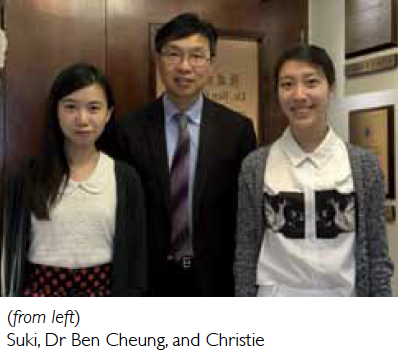© Hong Kong Academy of Medicine. CC BY-NC-ND 4.0
DOCTOR FOR SOCIETY
Expect the unexpected: an interview with Dr Ben Kin-leung Cheung
Suki Ho1; Christie Wong2
1 Year 4, Faculty of Medicine, The Chinese University of Hong Kong, Hong Kong
2 Year 3, Faculty of Medicine, The University of Hong Kong, Hong Kong
“The young man jumped the next day while on leave
from hospital. He never returned,” Dr Cheung recalled
an encounter during his time at Kwai Chung Hospital,
after a patient had committed suicide. “When his
mother arrived on the ward, I was very worried.
However, she told me that it wasn’t my fault. Instead
we should blame those selling illicit drugs. This cause
of death is totally preventable, and I needed to help
victims of drug abuse.”
Dr Ben Kin-leung Cheung, a highly respected
leader in the field of psychiatry, is also Chairman of
the Action Committee Against Narcotics (ACAN).
The ACAN is a non-statutory advisory body that aims
to advise the government on policies and measures
regarding substance abuse. It acts as a bridge
between the general public and the government in
the fight against narcotics. Dr Cheung was involved
in the rehabilitation of drug addicts when working
with the Hospital Authority, and has continued his
fight against drug addiction since moving into private
practice.
After graduating in 1987, Dr Cheung started
working in the field of general adult psychiatry. Similar
to many, during his early career he did not like drug
abusers—the never-ending admissions, rudeness
without any gratitude to doctors, and sometimes
threats. They lied, they shouted, they hit you. One
lady would fake a recurrent wound infection and
ask for antibiotics that she could trade for cocaine; a
gentleman refused treatment and then scratched Dr
Cheung’s car to show his discontent. One can imagine
Dr Cheung’s general impression of drug abusers.
Yet the case of a particular young drug abuser
changed Dr Cheung’s opinion. “I used to believe that
it was their choice to take drugs, and they should
bear the consequences.” It was not until the patient
committed suicide that Dr Cheung started to put
himself in the drug abusers’ place. In the case of this
patient, “He brought joy and energy to the ward. His
mental state improved rapidly once he stopped taking
illicit drugs, and I allowed him home leave. He never
came back. Even after so many years, I still remember
the smile on his face when he was sitting on his bed,
playing guitar.” His life was not supposed to end like
this. Had it not been for the moment of weakness
when he resumed drug abuse, he might still be alive
today, living life to the full. “Substance-induced
psychiatric morbidity is a totally preventable illness. If
a person recovers, a door opens. They can turn their
life around.”
Dr Cheung joined ACAN in 2008 and became
Chairman in 2014. Now Dr Cheung is on the panel
of ACAN, and has the opportunity to advise on
government policies, and to coordinate agencies to
fight drug abuse at a community level. After training
in Canada and the United States, he realised it was
inefficient to work case by case. Dr Cheung began
to build up a service model that could be passed
on to others. In response to an epidemic of youth
substance abuse in 2008, Dr Cheung was the first to
develop an innovative body check-up programme that
applied motivational theories to engage psychotropic
substance abusers early on. Motivational interviewing
is a counselling approach developed by Professor
William R Miller. Its original study aimed to give
stage-targeting intervention to alcoholics. Dr Cheung
adapted and applied the approach to drug addicts. A
free body check-up is offered to them. Information
that is of concern—such as skin age, exercise tolerance,
liver function, cognitive function—is provided
confidentially, with reference to non-drug abusers.
“This plants a seed in their mind, the idea that they
can improve their health and the motivation to do so.
Once they have the determination to succeed, health
institutions can offer help. The drug victims will
then try to reduce the drug dose, eventually quitting.
They can progress to the next stage, choosing a new
future.” This model is widely adopted in Hong Kong
by different health care professionals and allied health
workers, and benefits a large number of clients with
documented favourable outcomes.
Dr Cheung then started to think about how
to help those victims of drug abuse. He placed more
focus on the increasing cases of substance-induced
psychosis that leads to tragedies such as suicide and
mental impairment. He established that many drug
abusers did not choose to start taking drugs, and
nobody wanted to die from them. “Drug abusers
have often had a difficult past or poor environment
that led them to take illicit drugs. They are victims of
their past. They may not have intended to become an
addict, they just can’t stop.” Since then, Dr Cheung
has placed more emphasis on the treatment and
rehabilitation of drug abusers. He set up cluster-based
detoxification cubicles in hospital wards under
the Hospital Authority. The detox units provide
a homely environment with daily necessities and
entertainment, giving the drug abusers a feeling
of a home. He mentioned that the process of
detoxification should never be harsh; a comfortable
environment will decrease resistance to treatment
and help motivate individuals to seek help. From audit data,
the complete detoxification rate confirmed by urine
toxicology upon discharge is around 90%, which is
a very encouraging number. “However in the field
of addiction, quit rate is not the sole determinant of
treatment outcome. We also used a set of indicators
that include abstinence, employment, recidivism,
casualty department attendance, hospitalisation, and
retention rate to measure treatment outcome.” The
detox cubicles help drug abusers break away from the
clutches of illicit drugs and significantly improve their
future prospects.
The next step is to help victims see a future and
give them hope. “Often they do not care about their
future and hate to think about their pitiful past. The
only thing they value is today. It is crucial to encourage
them to reflect on the past and think about their
future.” Finding a meaning to life can give strength.
Art therapy is recommended by Dr Cheung, allowing
them to express their thoughts. “A patient once drew
a picture of a toilet, the scene of her previous drug
taking, to sum up her past. She acknowledged her past,
drew a line under it, and began to think of a change
for her future.” The drawings of patients can directly
reflect their mind and mood. Throughout different
stages of art therapy, the drawings changed. “When
we first met, this patient drew a moody-looking sky
with raindrops. After a few sessions of counselling,
his drawing transitioned into one of a sunny day, and
finally a rainbow.” Dr Cheung was motivated by the
recovery of drug addicts, and he decided to study
abroad, finding new ways to help them.
In response to the current situation in Hong
Kong, Dr Cheung is determined to tackle two
challenges. Firstly, there is an increasing number of
drug abusers in young adulthood aged 21 to 35 years.
Dr Cheung suggests that more support is needed by
this age-group, for instance, vocational training, job
opportunities, and family support. He has proposed to
the government that they adjust resource deployment
in existing services accordingly, and address service
gaps. He also proposed short-term services to
residential drug treatment service institutes for
addicts with gainful employment or family members
to care for, so as to lower the threshold of when young
addicts seek help.
Secondly, ‘ice’ has taken over ketamine as the
most popular psychotropic substance of abuse. Dr
Cheung is concerned that ‘ice’ is associated with much
greater psychiatric morbidity. He proposed that the
government should enhance relevant training for antidrug
workers in the management of complications
and increase collaboration between social workers
and medical professionals.
“Never underestimate yourself and always
follow your dream.” The inspiration for Dr Cheung
to devote his time to helping drug addicts was the
passion to help valuable young lives. “You may not
have gone where you intended to go, but you will end
up getting to where you are needed most.” Dr Cheung
said that even if you have never expected to work in
certain areas, never say never. You will then be able
to find out the meaning of walking such a path. We
should not let passion fade away, but hold on to it and
have the courage to act.
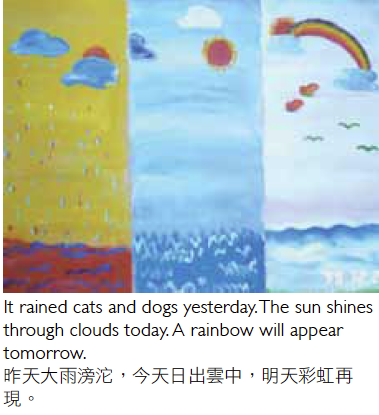
It rained cats and dogs yesterday. The sun shines through clouds today. A rainbow will appear tomorrow.
昨天大雨滂沱,今天日出雲中,明天彩虹再現。
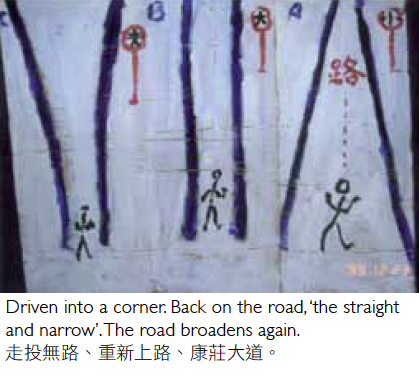
Driven into a corner. Back on the road, ‘the straight and narrow’. The road broadens again.
走投無路、重新上路、康莊大道。
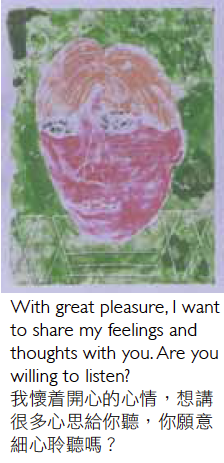
With great pleasure, I want to share my feelings and thoughts with you. Are you willing to listen?
我懷着開心的心情,想講很多心思給你聽,你願意細心聆聽嗎?
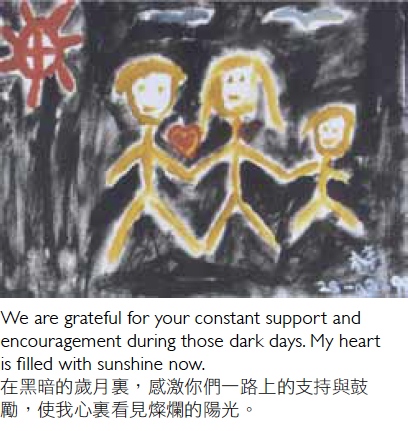
We are grateful for your constant support and encouragement during those dark days. My heart is filled with sunshine now.
在黑暗的歲月裏,感激你們一路上的支持與鼓勵,使我心裏看見燦爛的陽光。
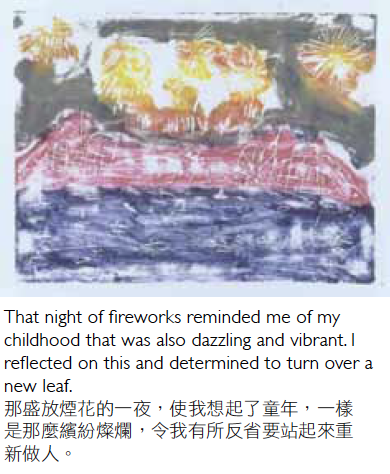
That night of fireworks reminded me of my childhood that was also dazzling and vibrant. I reflected on this and determined to turn over a new leaf.
那盛放煙花的一夜,使我想起了童年,一樣是那麼繽紛燦爛,令我有所反省要站起來重新做人。


